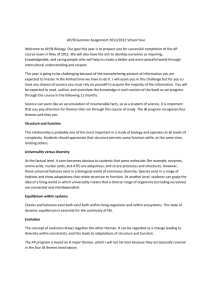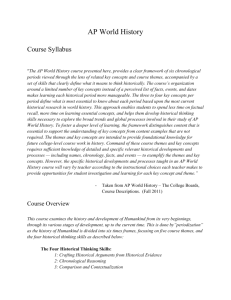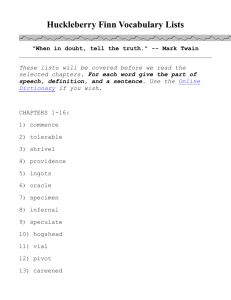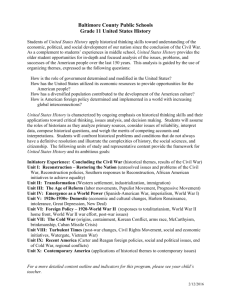APUSH Instructor: E. Moody Rm. 610, Office 608 emoody@cfsd16
advertisement
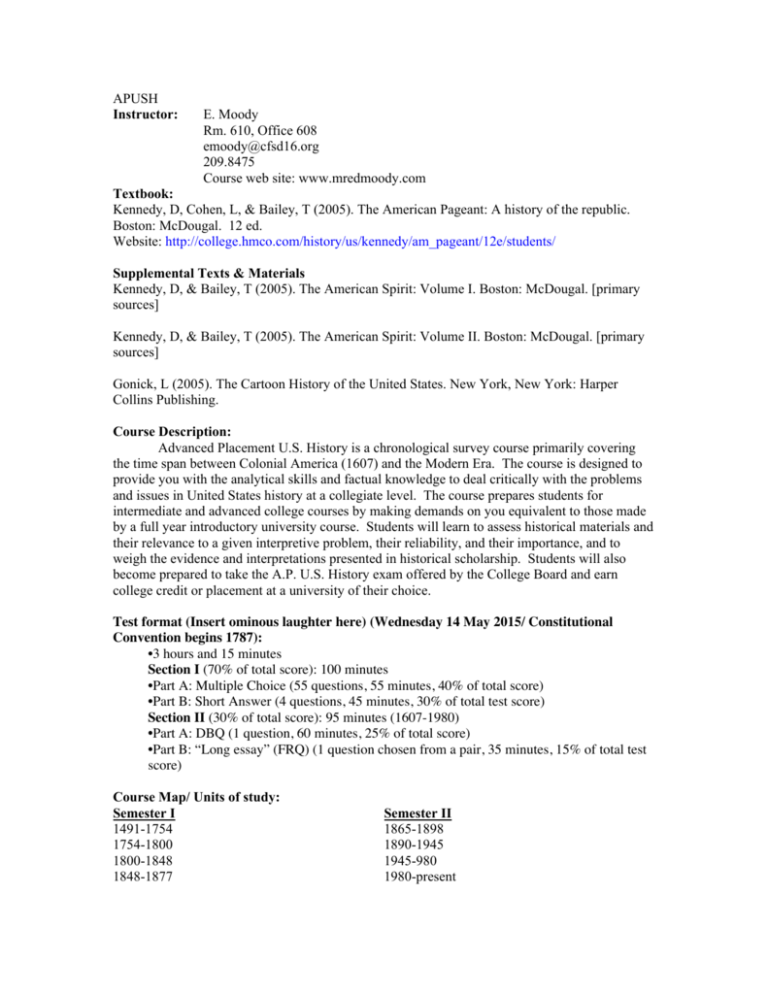
APUSH Instructor: E. Moody Rm. 610, Office 608 emoody@cfsd16.org 209.8475 Course web site: www.mredmoody.com Textbook: Kennedy, D, Cohen, L, & Bailey, T (2005). The American Pageant: A history of the republic. Boston: McDougal. 12 ed. Website: http://college.hmco.com/history/us/kennedy/am_pageant/12e/students/ Supplemental Texts & Materials Kennedy, D, & Bailey, T (2005). The American Spirit: Volume I. Boston: McDougal. [primary sources] Kennedy, D, & Bailey, T (2005). The American Spirit: Volume II. Boston: McDougal. [primary sources] Gonick, L (2005). The Cartoon History of the United States. New York, New York: Harper Collins Publishing. Course Description: Advanced Placement U.S. History is a chronological survey course primarily covering the time span between Colonial America (1607) and the Modern Era. The course is designed to provide you with the analytical skills and factual knowledge to deal critically with the problems and issues in United States history at a collegiate level. The course prepares students for intermediate and advanced college courses by making demands on you equivalent to those made by a full year introductory university course. Students will learn to assess historical materials and their relevance to a given interpretive problem, their reliability, and their importance, and to weigh the evidence and interpretations presented in historical scholarship. Students will also become prepared to take the A.P. U.S. History exam offered by the College Board and earn college credit or placement at a university of their choice. Test format (Insert ominous laughter here) (Wednesday 14 May 2015/ Constitutional Convention begins 1787): •3 hours and 15 minutes Section I (70% of total score): 100 minutes •Part A: Multiple Choice (55 questions, 55 minutes, 40% of total score) •Part B: Short Answer (4 questions, 45 minutes, 30% of total test score) Section II (30% of total score): 95 minutes (1607-1980) •Part A: DBQ (1 question, 60 minutes, 25% of total score) •Part B: “Long essay” (FRQ) (1 question chosen from a pair, 35 minutes, 15% of total test score) Course Map/ Units of study: Semester I 1491-1754 1754-1800 1800-1848 1848-1877 Semester II 1865-1898 1890-1945 1945-980 1980-present Class Requirements: Students will create and maintain a separate AP U.S. history notebook. There will be a minimum of four major examinations throughout the year, in conjunction with numerous readings, varied essays, and individual assignments. These exams may be comprehensive in nature. Students will also submit written responses to readings of primary and secondary sources. Students in Advanced Placement U.S. History are expected to attend class regularly and on time, with all requested materials and prepared to participate, including having done the assigned reading. Students are encouraged to express their opinions and thoughts on any topic under discussion. All students and the instructor will be treated with dignity and respect. Disagreement is expected and encouraged, as long as it is conducted in the aforementioned atmosphere of respect. Late assignments will only be accepted within assignment guidelines, which will be announced, typically within 5 days of the assignment being handed back. All exams and quizzes must be taken on the announced and arranged date, unless other arrangements are made with the instructor ahead of time. Class Behavioral Expectations: Follow all school rules -ALL school rules, including the honor code, will be followed in this class. Be prepared for class -Students are expected to in the class “on time.” -This includes having your notebook, text, and writing utensil ready or available. -Have a dedicated class notebook. -Be courteous and respectful. -As juniors and seniors who can be arrested as adults, behave as adults. You will be courteous, respectful, and polite toward the class, your classmates, and instructors. - All students have the right to their opinion. The classroom is an open forum for discussion and ideas. Respect for the opinion of others is a class requirement. -There will be no covers worn in class. Cheating will not be tolerated. -Any student cheating on a test, quiz, or homework assignment will receive a zero for that assignment and school consequences WILL be invoked. Spend time outside of class preparing. -This isn’t the type of class that you can read the chapter the night before for. Most of the chapters are approximately 25 pages long and we will be covering up to 2-3 a week. To be successful, outside reading is mandatory and expected. Leave technology for another part of the day. -Moodyland is a cell phone, ipod, mp3, calculator…. Et cetera, technology free zone. Keys to Success: The most important grading factor in this class is consistent effort and improvement and a scholarly attitude. If you knew the material already, you wouldn’t need the course. What you will learn in terms of writing, thinking, and study skills will be worth the effort! Always give your personal best. You need to read your text carefully and DAILY. Not keeping up with reading and review is the most common mistake students’ make. The reading is considerable and getting behind will be detrimental to your success. TIME MANGAGEMENT is an essential skill for this class. Take notes, be attentive in class, participate in daily discussions, ask questions, answer them and be prepared! Tests will not only cover the text material but what is discussed in class. Not all material in the text will be discussed in class, however you are responsible to be prepared for anything! Keep a notebook and be organized. Save everything! Organize your notes; work thorough them and constantly review. If you need anything…. ASK! We are experiencing this course together and through open communication we will be successful! Grading: In line with district academic standards, the final grade will reflect the instructor’s evaluation of the student’s academic performance utilizing 4-point rubrics of the skills to be assessed. Written work will be evaluated on the clarity of thesis, quality of the supporting details, and strength of the analytical arguments presented, using CFSD and AP scales. Final grades will be calculated according to performance on associated rubrics. Rubric Score Letter Grade Conversion Rubric Score Letter Grade Conversion 3.83 3.67 – 3.82 3.50 – 3.66 3.25 – 3.49 3.00 – 3.24 A+ A AB+ B 2.75 – 2.99 2.58 – 2.74 2.42 – 2.57 2.25 – 2.41 <2.25 BC+ C CF Course Outline Unit 1: Colonial History Chapters 1-6 Themes: 1. The emergence of American cultural traits and the factors that contributed to them. 2. Emerging regional patterns and how they evolved. Unit 2: Independence Chapters 7-8 Themes: 1. Colonists reevaluate their relationship with Great Britain and with each other. 2. The American Revolution as a conservative or a radical movement. 3. The American Revolution’s place in world developments of the time period. Unit 3 Building a New Nation and Jefferson Chapters 9-11 Themes: 1. Impact of colonial experience on post-independence government 2. Development of the United States Constitution and the Bill of Rights 3. The emergence of political parties and the factors that divided them 4. The development of sectional specialization and interdependence 5. The conflict between national power and states’ rights 6. The peaceful transfer of power from one party to another. Unit 4: Growth of Nationalism and The Age of Themes: 1. National growth and the growth of nationalism. 2. Second war for Independence 3. Era of Good Feelings 4. The emergence of the second American party system. 5. The emergence of the “Common Man” in American politics. Chapters 11-13 Unit 5: Reform, Slavery and Sectionalism Themes: 1. Reform movements and the American character. 2. Geographical and economic expansion – manifest destiny! 3. Sectionalism 4. Slavery and causes of the War of Northern Agression Chapters 14-18 Unit 6: Civil War and Reconstruction Themes: 1. Secession and war 2. Reconstruction issues and plans 3. The struggle for equality 4. Indian relations Chapters 19-22 Semester 1 Final Comprehensive Multiple Choice and Essay Exam Unit 7: Rise of Business and Labor, Populists Themes: 1. Political alignment and corruption in the Gilded Age. 2. Role of government in economic growth and regulation. 3. Social, economic, and political impact of industrialization. 4. Immigration and urbanization 5. Inflation/Deflation — Role of government in the economy Chapters 23-26 Unit 8: Progressives and Imperialism Chapters 27-30 Themes: 1. Bryan and Wilson: “Jeffersonian goals in Hamiltonian form” (Conflict and Consensus) 2. Teddy Roosevelt/Taft/Wilson: Conservatives as Progressives (reform to preserve) 3. The changing role of the U.S. in world affairs — from isolationism to world power. Unit 9: World War I, 1920s-1930s Chapters 31-33 Themes: 1. U.S. motives in World War I and post-war agreements. 2. Post-World War I compared to post-War Between the States nativism, laissez-faire, labor government, farmers, and attitudes toward reform. 3. U.S. pursuit of “advantages without responsibilities.” 4. Cultural conflicts: native v. foreign; rural v. urban. 5. Revolution in manners and morals. 6. The role of government in society and the economy early 1930’s 7. Human suffering and why its productive, and Republican response to the Great Depression. Unit 10: New Deal and World War II Chapters 34-36 Themes: 1. Democrat response to the Great Depression. 2. Comparison of Wilson and Roosevelt as neutrals, wartime leaders, Allied partners, post-war planners. 3. U.S. adopts new role as peacetime leader in post-war world. 4. Home front conduct during World War I and World War II. Unit 11: Cold War and Post-War Domestic Issues Themes: 1. Post war prosperity. 2. Origins of the cold war. 3. Truman, Eisenhower, Kennedy, Johnson – Similar? Different? 4. Struggle for civil liberties and civil rights. Chapters 37-39 Unit 12: 1970’s to 2005 A time of Change Themes: 1. Cycles of freezes and thaws in East-West relations. 2. The “Vietnam Syndrome” in post-war foreign policy. 3. Human rights v. strategic self-interest in policy formulation. 4. Interrelationship of foreign policy and economic stability. 5. Rise of Conservatisms 6. Globalization. Chapters 40-42

